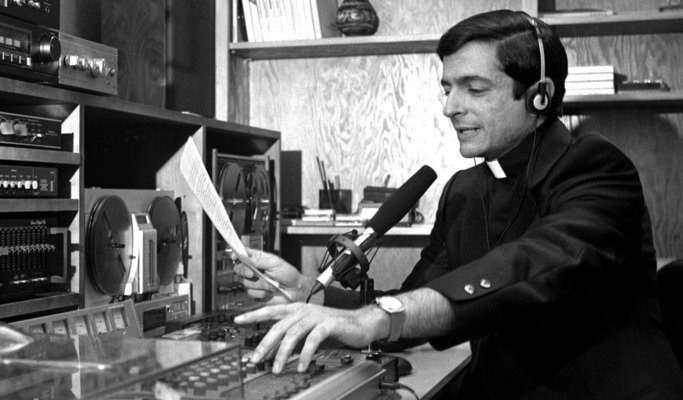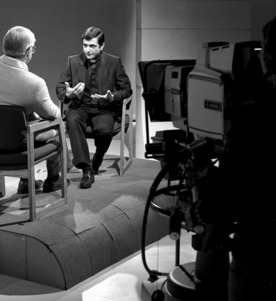
A platform that encourages healthy conversation, spiritual support, growth and fellowship

NOLACatholic Parenting Podcast
A natural progression of our weekly column in the Clarion Herald and blog

The best in Catholic news and inspiration - wherever you are!
A discarded piece of paper and an open-book revelation
-

Pedro Nuñez was a child when Fidel Castro’s soldiers barged into the small farmhouse his father owned in Sagua la Grande, Cuba, about 200 miles east of Havana, to deliver an unassailable eviction notice.
“The soldiers told my father, ‘We don’t care where you go, but you have 24 hours to get out,’” Father Nuñez recalled. “It was really painful. My father was like my hero. I saw him falling on the floor and crying like a baby.”
As the Nuñez family scrambled to find another place to live, things got worse for the next few years until, in 1962, Pedro and his younger brother made their way to Miami, unaccompanied by their parents as part of the Cuban child refugee program, Operation Pedro Pan.
What the 14-year-old worried about the most was whether or not he would ever see his parents again.
“Actually, in my early years, as a child and then as a teenager, I was a pretty violent person,” he said. “I wanted nothing to do with God.”
After leaving their initial pit stop in Miami for New Orleans, the Nuñez brothers were placed in an orphanage, and seven months later, a foster home took them in. Pedro started earning money at 15 as a waiter and attended Holy Cross and then LSU.
Louis Aguirre, a fellow Pedro Pan immigrant and unofficial foster brother, was one year ahead of Pedro at LSU when a dean called in the two Cuban students and suggested that with the Vietnam War raging, they might want to get around to selecting a major.
As they walked back to their $90 a semester dorm room, conveniently located on the second floor of Tiger Stadium, Pedro said he had an idea.
“Back then, Pedro had a girlfriend and we double-dated and he was pretty religious,” Aguirre said. “So, he grabbed the course catalog and blessed it and said a long prayer. I don’t remember if the prayer was in English or Spanish or Spanglish. All I know is we said, ‘Wherever it falls, that’s what we’re going to study.’ We opened up the catalog, and it said ‘Journalism.’”
For the record, God understood.
Aguirre went on to become a Catholic journalist for more than 40 years, most prominently as editor of The Bayou Catholic in the Diocese of Houma-Thibodaux. After a conversion experience at LSU, Pedro went on to ordination as a priest for the Archdiocese of New Orleans in 1977 and for decades directed one of the most prominent Hispanic Catholic communication efforts, Mensaje (“Message”), which he founded in 1979.
Even though he officially retired in 2020, Father Nuñez, 74, the first Hispanic priest ordained for the archdiocese, continues to host “Conozca e Primero Su Fe Catolica” (“Know Your Catholic Faith First”), an EWTN program in which he discusses all elements of the faith and answers questions. He lives most of the year in Birmingham, Alabama.
 For his lifetime of communications work, Father Nuñez was honored recently by the Hispanic Apostolate at its annual gala, and proceeds from the gala dinner raised nearly $40,000, which will be used to help defray the cost of Catholic school tuition for Hispanic Catholics.
For his lifetime of communications work, Father Nuñez was honored recently by the Hispanic Apostolate at its annual gala, and proceeds from the gala dinner raised nearly $40,000, which will be used to help defray the cost of Catholic school tuition for Hispanic Catholics.“He is the No. 1 Hispanic priest on Facebook with 1.5 million followers,” said Dominican Father Sergio Serrano. “He is well-known from Argentina to Alaska. Everybody knows who he is. He has been an inspiration because he has gone beyond our own boundaries. He has a special charism.”
Father Nuñez looks back at the pivotal moment in his life at LSU when he picked up a piece of paper from the floor and saw an image of Jesus that “changed my whole way of thinking.”
“My last year at LSU I was already engaged and planning to get married,” he said. “I had no idea, no conception of what it meant to be in a relationship with Christ. I was going from one building to another when I saw this piece of paper on the floor. I saw that it had part of the face of Jesus and I opened it, and there was a passage from the Gospel of Matthew, Chapter 11, verse 28, ‘Come to me.’ I thought maybe this was meant for somebody else, but, actually, God meant it for me.”
As he passed by the LSU Newman Center – the Christ the King Parish chapel – he felt compelled to walk inside.
“It was like all my heart froze, and for the first time in many years, I said something to God: ‘If you exist, I want to know you,’” Father Nuñez said. “From then on I decided to get to know the Lord better.”
When he began to feel that God was calling him to serve him “on full-time basis, I said, ‘No way!’”
He told his fiancée he was going to apply for the seminary to test the vocation, “hoping they would never ask me to come – but they did.”
His first look at Notre Dame Seminary gave him a vision of “Dracula’s castle.” He was so nervous, he told his spiritual director this probably wasn’t for him.
“He told me, ‘Pedro, you will not be doing justice to yourself or to the Lord unless you stay here for a year,’” Father Nuñez said. “I couldn’t speak in front of people I was so nervous. I remember asking my classmates to take the preaching assignments that I had to do at different times in the chapel, and I would write their homework or do something for them.”
One professor of systematic theology told him his delivery was so poor that he wrote “in big red letters, ‘This is a bunch of platitudes!’ It was like saying, ‘This is worth nothing.’”
But another priest professor softened the blow by saying, “You have presence.”
“I didn’t know what it meant,” Father Nuñez. “Slowly but surely, I started talking to two people and then to small groups. And now, I preach to thousands and thousands of people. At EWTN, we are reaching out to millions of people.”
He says his metamorphosis best can be described by St. Paul’s Letter to the Philippians:
“Chapter 4, Verse 13: ‘I can do all things through Christ who strengthens me.’”
In 1998, Father Nuñez met Havana Cardinal Jaime Ortega in New Orleans when the cardinal was allowed by the communist government to make a rare visit to the U.S. for the national Catholic Media Conference.
Aguirre, Father Nuñez’s boyhood friend, was serving as the unofficial tour guide for the cardinal and introduced him to the priest of his native land.
The cardinal smiled and asked, “You are Pedro Nunez?”
“Yes, your eminence.”
“My mom listens to your show all the time.”




